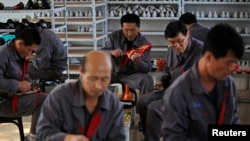The Global Slavery Index estimates that more than 40 million people around the world were subject to conditions similar to slavery.
The report said North Korea and Eritrea had the highest percentages in the world of what it calls “modern slavery.”
The numbers for the report come from 2016.
What is modern slavery?
The study defines modern slavery as human trafficking, forced labor or debt bondage. The report also considers forced marriage and the sale and exploitation of children as modern slavery.
The Walk Free Foundation based in Australia has published the study since 2013.
India has the highest total number, 8 million people believed to work under slave-like conditions.
And North Korea has the highest percentage: one in ten people in North Korea are considered modern slaves, with “the clear majority forced to work by the state.”
For example, North Korea has used foreign workers to earn money for the government under harsh conditions. The researchers for the study spoke to 50 defectors from North Korea. Overall, 2.6 million people in North Korea live in modern slavery conditions, the study said.
The goal of the index is to pressure governments and companies to do more to end the problem of modern slavery. The Walk Free Foundation also wants more information about the real number of people affected by the problem.
Who is responsible, and what can be done?
The responsibility for modern slavery conditions, the report says, lies with developed nations because they import $350 billion worth of goods from developing countries. These goods, it says, are produced under questionable conditions.
Products that could be linked to the use of slave labor include coal, coca, cotton, wood and fish.
The report said two problems permit modern slavery to continue. They are repressive governments that use forced labor for support, and conflicts that cause a breakdown in the rule of law.
The report recommends that governments and businesses take action by making human rights a top issue in dealing with repressive nations.
After North Korea and Eritrea, the study found Burundi, the Central African Republic, Afghanistan and Mauritania also had high levels of slavery. South Sudan, Pakistan, Cambodia and Iran were also near the top of the list.
I’m Mario Ritter.
Smita Nordwall reported this story for VOA News. Mario Ritter adapted it for VOA Learning English. Kelly Jean Kelly was the editor.
________________________________________________________________
Words in This Story
bondage –n. the state of being a slave
exploitation –n. to use someone or something in an unfair way
We want to hear from you. Write to us in the Comments section, and visit our Facebook page.





